Who’s up, down and out at China’s Congress?
China’s National People's Congress is largely a rubber stamp for policy but it is still closely watched for indications of who is on the rise or on the way out in Beijing.
China’s National People's Congress is largely a rubber stamp for policy but it is still closely watched for indications of who is on the rise or on the way out in Beijing.
Beijing has been criticized for its Great Firewall and online censorship. Now it's looking prescient.
U.S. president Donald J. Trump’s antagonism toward major media outlets has created an opportunity for China’s leaders to offer up a contrasting, seemingly more open style—however misleading that is.
Property sales by area rose 25.1 percent year-on-year in January and February.
China issued a raft of upbeat data on Tuesday showing the economy got off to a strong start to 2017, supported by strong bank lending, a government infrastructure spree and a much-needed resurgence in private investment.
There are more such tactics being adopted this year.
Wang Jianlin has led a triumphal march through Hollywood.
Peter Navarro doesn't speak Chinese, and has scant in-country experience. Should that matter?
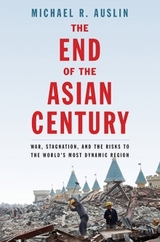
Since Marco Polo, the West has waited for the “Asian Century.” Today, the world believes that Century has arrived. Yet from China’s slumping economy to war clouds over the South China Sea and from environmental devastation to demographic crisis, Asia’s future is increasingly uncertain. Historian and geopolitical expert Michael Auslin argues that far from being a cohesive powerhouse, Asia is a fractured region threatened by stagnation and instability.
Lighthizer has urged a harder-nosed approach to China, which accounts for more than half of America’s $500-billion trade deficit, and more trade complaints from the U.S.
On Saturday, in the strongest public signal yet that Beijing is changing course, China’s commerce minister castigated what he called “blind and irrational investment.”
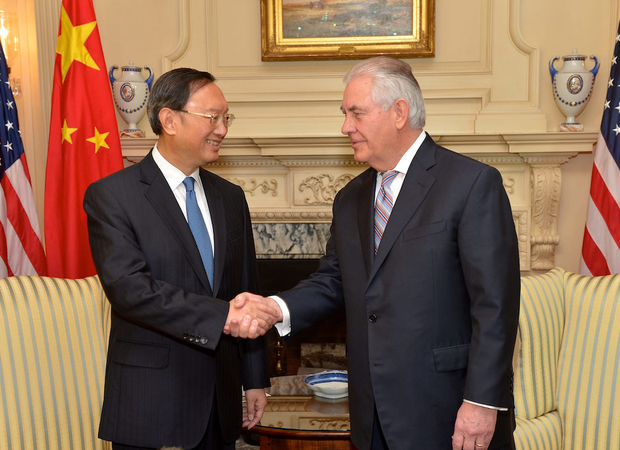
Jane Perlez has been a reporter at The New York Times since 1981. She won a Pulitzer Prize in 2009 for coverage of the war against the Taliban and al Qaeda in Pakistan and Afghanistan. She has reported on wars, diplomacy...

The Trump administration has spurred a debate in the United States on how to best manage the complex bilateral relationship with Russia. Paul Haenle sat down with Carnegie scholars Andrew Weiss, Paul Stronski, and Alexander Gabuev...
The United States rebuffed a proposal from China to “apply the brakes” to an escalating standoff with North Korea, saying “positive action” was required before either country would engage with “irresponsible” leader Kim Jong Un.
China expressed concern on Thursday over revelations in a trove of data released by Wikileaks purporting to show that the CIA can hack all manner of devices, including those made by Chinese companies.
A wave of anti-South Korean sentiment has broken out across China after the South’s embrace of an American missile defense system that China says can be used to spy on its territory.

In late February, U.S. President Donald Trump called for adding $54 billion to the U.S. military budget—an increase of roughly 10 percent. And in early March, despite outcry from Beijing, the United States began deploying the Terminal High-...
China lashed out at the United States for its “terrible human rights problems” in a report on Thursday, adding to recent international criticism of Washington on issues ranging from violence inflicted on minorities to U.S. immigration policies....
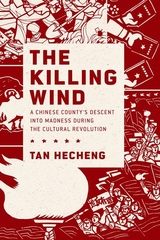
Over the course of 66 days in 1967, more than 4,000 “class enemies”—including young children and the elderly—were murdered in Daoxian, a county in China’s Hunan province. The killings spread to surrounding counties, resulting in a combined death toll of more than 9,000. Commonly known as the Daoxian massacre, the killings were one of many acts of so-called mass dictatorship and armed factional conflict that rocked China during the Cultural Revolution.
China’s foreign minister has a plan to ease tensions in East Asia: North Korea should stop testing missiles, and the United States and South Korea should stop joint military exercises, he said Wednesday.
Now, as the deployment of the system begins this week and China threatens to punish South Korea further, companies like Beyond Cosmetics have been bracing for worse.
China has given U.S. President Donald Trump the chance to expand his brand, after approving dozens of applications to register the Trump trademark.
The arrival of Donald Trump in the White House threatens a significant acceleration in the rivalry between the U.S. and China.
The backlash is painful, but it coexists with progress as women activists manage—slowly—to bring about a change in attitudes
China has said it will take unspecified measures against a U.S. missile system being deployed in S. Korea, and warned that Washington and Seoul will bear the consequences.
China’s plan to advance its manufacturing capabilities is drawing criticism from one of its major trade partners.
China’s Communist leaders will this week introduce sweeping new laws that codify social responsibilities for the country’s 1.4 billion citizens while also providing some modest new protections.
China is proud of the fact that its air quality readings have improved in recent years, if only slightly, with lingering smog in industrial areas.
At 7:36 a.m. Monday, local time, North Korea launched four missiles that flew about 600 miles over land before splashing into the Sea of Japan.
Avoiding controversial questions and sticking closely to the script, three leading candidates jostling for a spot on the Communist Party’s apex of power made rare public appearances on the sidelines of China’s annual meeting of parliament on...
The president has described his border proposal as ‘the Great Wall of Trump,’ evoking what one expert sees as a calamitous and ill-conceived folly
China’s announcement of the smallest percentage increase to its military budget since 2010—around 7% (to approximately $148 billion)—seems designed in part to project the image of being the sober, peaceful force in the Asia-Pacific sphere.
Chinese authorities have shut down activist Ye Haiyan’s blogs and forced her to move from one city to another. Left with few options, she now produces socially conscious paintings to make a living and advocate for the rights of sex workers and...
British comedian John Oliver recently flew to the north Indian town of Dharamsala, where the Dalai Lama has lived in exile for more than five decades.
The story reveals more about the exercise of power in China than any interview ever could. It is one that involves violence, intimidation and a forced confession—in which I found myself apologizing for “behavior causing a bad impact” and for...
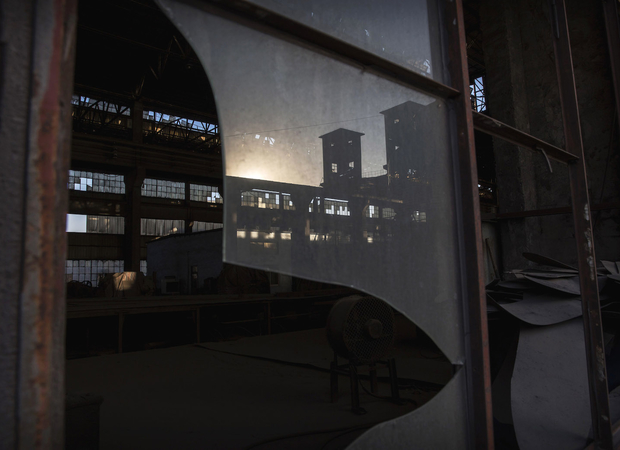
Curbing wasteful socialist-era business practices and taming unruly real estate and lending sectors will take center stage at the annual meeting of China’s legislature, which starts next week, with some also looking for signs of a...
Chinese jets and warships carried out exercises near Taiwan and into the Western Pacific on Thursday, as the self-ruled island's defense minister warned of a growing threat from its giant neighbor.
Since the election of Donald Trump, the relationship between Washington and Beijing has appeared strained. Despite diplomatic efforts to bridge the gap, China and the United States are at loggerheads over a variety of issues, including trade and...

Long before London and New York rose to international prominence, a trading route was discovered between Spanish America and China that ushered in a new era of globalization. The “Ruta de la Plata,” or “Silver Way,” catalyzed economic and cultural exchange, built the foundations for the first global currency, and led to the rise of the first “world city.” And yet, for all its importance, the Silver Way is too often neglected in conventional narratives on the birth of globalization.
China is in the midst of what it calls a “people's war on terror” in its far west. What sparked this latest campaign was a knife attack.
For the past three years, China has allowed its currency, the renminbi, to weaken in value compared with the American dollar. Yet the renminbi’s slide has provided only a marginal benefit.
China has launched a Donald Trump-style attack on foreign media, branding claims that a leading human rights lawyer was tortured by government agents “fake news.”
China’s “two sessions” kicks off this week, bringing together all of the movers and shakers from the top echelons of government for the nation’s two big annual political shindigs.

Latin Americans can’t afford to wait four years to see when the United States will be willing to have an honest and reciprocal conversation about economic prosperity in the Western Hemisphere. Luckily for the U.S.’s southern...
ISIL fighters from China’s Uighur ethnic minority have vowed to return home and “shed blood like rivers” in what security experts said marked the first such threat against Chinese targets.
Beijing fired back Wednesday at President Trump’s claim that the U.S. has “lost 60,000 factories” since China joined the World Trade Organization, with a top diplomat suggesting the president told only part of the story.
As President Trump talked up his plans to help American coal and steel workers in his address to Congress, a top official thousands of miles away in Beijing was detailing China’s plans to cut half a million jobs in heavy industries this year.
Since1996, the Chinese military has steadily expanded its umbrella of land-based missiles, strike aircraft, and submarines designed to overwhelm both U.S. air bases and carrier strike groups.
According to a new report from U.S.-based NGO Freedom House, persecution of Chinese Christians and other faith groups has “intensified” in recent years.
Chinese foreign minister Wang Yi’s decision to make Africa his first stop on a five-nation tour in early January highlights the importance China places on its relations with Africa.
Russia on Tuesday cast its seventh veto to protect the Syrian government from United Nations Security Council action, blocking a bid by Western powers to impose sanctions over accusations of chemical weapons attacks during the six-year Syrian...
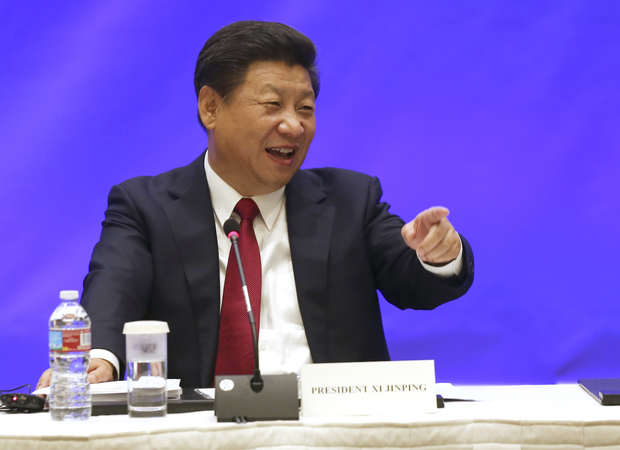
On February 17, China’s Communist Party Chairman Xi Jinping announced what he called the “two guidances.” Beijing should now “guide the international community to jointly build a more just and reasonably new world order,” Xi said in an important...
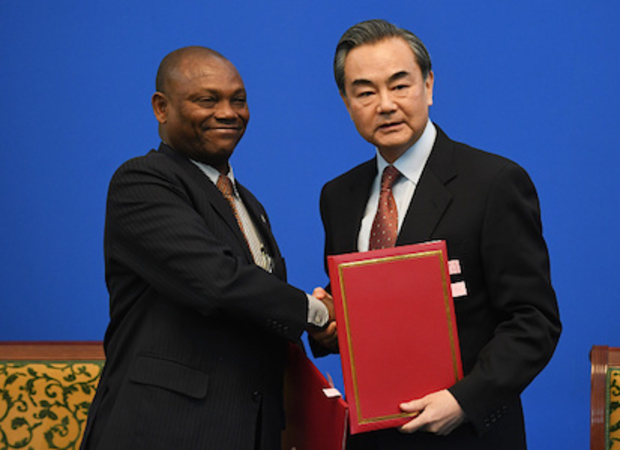
In this week’s episode of the China in Africa podcast, Matt Ferchen from the Carnegie-Tsinghua Center for Global Policy in Beijing joins Eric and Cobus to discuss his new paper on the perception gaps that exist around the world...
Chinese state media have reacted with anger and boycott threats after the board of an affiliate of South Korea’s Lotte Group approved a land swap with the government that allows authorities to deploy a U.S. missile defense system
A senior Chinese diplomat had a brief meeting with President Donald Trump while at the White House for talks with the president's advisers
Before taking power Trump hinted he might reverse the US’s stance on Taiwan but later back-pedaled, prompting speculation he had capitulated to Beijing
Delay in Wanda’s $1bn takeover of Golden Globes producer signals shift in Beijing
The Chinese government may consider giving families financial incentives to have a second child in a bid to reach higher birth rate targets
Gambia’s new government has endorsed the “one China” policy and said it would not establish any official relations or contacts with Taiwan, continuing a policy adopted in March 2016 by the government of former leader Yahya Jammeh.